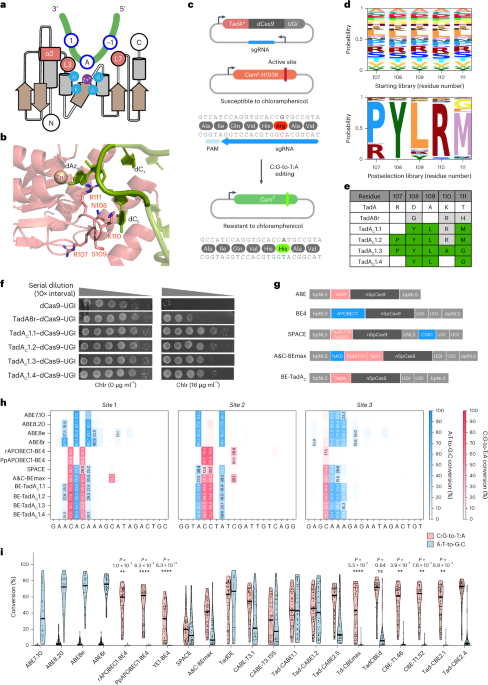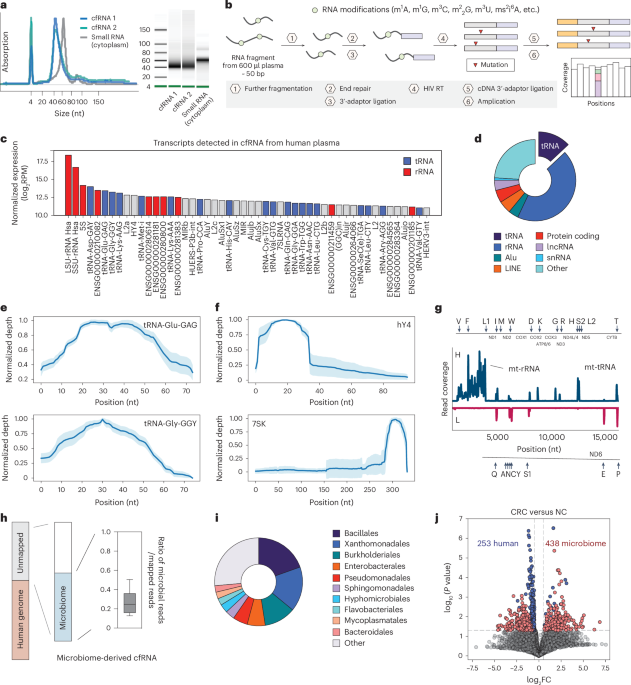Now Reading: Breakthrough in Cytosine Base Editing: Advancing Precision with Evolved Deaminase Technology
-
01
Breakthrough in Cytosine Base Editing: Advancing Precision with Evolved Deaminase Technology
Breakthrough in Cytosine Base Editing: Advancing Precision with Evolved Deaminase Technology

Fast Summary
- The article includes references to studies on AID/APOBEC-like deaminases and their roles in immunity, DNA editing, and biological systems across various organisms. Key points focus on advancements in programmable editing tools like CRISPR-based approaches targeting specific DNA bases without inducing large-scale genomic changes.
- These scientific breakthroughs are linked to therapeutic opportunities such as precise gene corrections, methylome mapping using enzymes, and minimized off-target effects with refined designs.
- Research indicators also include comparisons of enzyme functionality and diversity across species, focusing on implications for adaptive immune systems in higher organisms.
Indian Opinion Analysis
Advancements in genetic engineering discussed within the research have significant global implications with potential applications for India. India’s robust biotechnology sector stands to benefit by adapting these methods for healthcare innovation aimed at combating hereditary diseases or developing tailored medical treatments. Moreover, the possibility of utilizing precise base-editing enzymes could enhance agricultural productivity-an area critical to India’s food security needs. Though, ethical considerations surrounding genetic edits remain crucial as debates over biosafety regulations intensify globally. For India to lead this domain responsibly, continued investment in R&D and robust policy frameworks that align with international standards will be paramount.
Read More
https://doi.org/10.1073/pnas.1720897115Quick Summary:
- The raw text provided includes references to scientific studies focused on genetic editing technologies, particularly base editors and their advancements in precision and compatibility.
- Citations highlight innovations like CRISPR-free base editors,adenine base-editing variants,engineering of human APOBEC3 fusions,phage-assisted evolution techniques,and therapeutic applications derived from directed evolution.
- No direct information specific to India is included in the input content. Instead, the material concentrates on global biotech research with extensive reference documentation.
Indian Opinion Analysis:
Advancements in genetic editing technology have global implications for medicine and agriculture. For india-a country heavily reliant on agriculture and facing healthcare challenges-these innovations may open pathways for more precise genetic modification of crops (reducing reliance on pesticides or increasing yield) or personalized medicine tailored to disease prevalence among local populations. The transition of such technologies into practical use necessitates ethical oversight, regulatory clarity, and technology transfer mechanisms that ensure accessibility within India’s diverse socio-economic context.
Read more: Read MoreQuick Summary:
- The raw text appears to provide references and links to various scientific articles, predominantly focusing on advancements in CRISPR technology and base editing techniques such as adenine and cytosine modifications.
- Studies cited include innovations in targeted gene editing applications for plants, improved precision methods reducing off-target effects, structural insights into related enzymes like APOBEC1, codon translation analysis in E. coli, and machine-learning approaches predicting editing outcomes.
- This collection spans multiple years (2017-2023) and emphasizes research published in high-impact journals like Nature biotechnology, Cell, and others.
Indian Opinion Analysis:
India has actively invested in biotechnology research over the last few decades, paving avenues for agricultural development, medical breakthroughs, and industrial innovation. The referenced advancements could hold significance for India’s biotechnology sector as they promise enhanced accuracy across gene-editing platforms-a critical aspect for ethical considerations surrounding genetic modification. With its robust network of researchers collaborating internationally, India might leverage these findings further to promote sustainable agricultural practices or explore new therapeutic solutions targeting genetic disorders within the population. maintaining focus on minimizing off-target activities aligns with global efforts towards safer biotechnological applications.For full source details: Google Scholar ReferenceIt appears that the provided text is a list of citations related to academic or scientific studies in the context of genetics, genome editing, or biotechnological research. This does not contain specific content such as current events related to India. If you can provide a clear news article about India or Indian-related affairs, I’d be happy to create a concise summary and analysis for you!Quick Summary:
- The provided text lists scientific articles and references on advancements in genome editing technologies, focusing on CRISPR and base editor systems.
- Key topics include minimizing off-target effects,engineering variants for expanded targeting capabilities,reducing RNA errors,mutational studies in cancer patients,and precise genome manipulation thru prime editing.
- References span multiple journals (e.g., Nature, Science, Nat Methods) over several years (2017-2023).
Indian Opinion Analysis:
While much of the content revolves around international research efforts, India can view this growing field of advanced gene-editing technologies as a significant possibility to further strengthen its biotechnology sector. CRISPR-based tools could revolutionize healthcare solutions within India-from addressing genetic disorders to advancing cancer therapy-if their development is aligned with ethical standards and affordability. Moreover, fostering local talent in genomic research may enable India to contribute significantly to global innovation while ensuring accessibility for Indian citizens. However, stringent policies governing bioethics will be crucial as this area progresses.Read More: Analysis and minimization by DNA adenine base editors | Transcriptome-wide RNA editing by CRISPR | Reduced off-target activities in DNA editors
Quick Summary
- Topic: The provided text contains references related to cutting-edge genetic engineering research, specifically prime editing systems and base editors.
- Details:
– Various scholarly works are cited across prominent journals such as Nature communications, Cell, and Nature.
– Subjects covered include innovations in genome manipulation, targeting mutations for cancer therapy, improving prime editing mechanisms, and enhancing precision in cytosine/adenine base editors.
– The references explore methods like tada reprogramming and leveraging small RNA-binding proteins to enhance gene-editing outcomes.
Indian Opinion Analysis
The advancements described suggest significant developments in the field of genomic medicine that could have far-reaching implications globally. For India, these innovations present opportunities for boosting national capabilities in genetic research. As India continues investing in biotechnology hubs and initiatives such as genomics-based healthcare solutions, access to these techniques could pave the way for breakthroughs in treating genetic disorders prevalent among its population. Moreover, fostering global collaborations based on this research might align well with ongoing efforts to elevate india’s status within science-driven economies.
Quick Summary:
- The article predominantly focuses on advancements in genome editing technologies, highlighting innovations such as prime editing systems, Cas9 proteins, and adenine base editors.
- Multiple research studies are cited from journals like Nature, Cell, and Molecular Cell discussing increased precision, compact designs, and efficiency in genetic modifications.
- Applications of genome editing include diverse fields such as human stem cell engineering and potential therapeutic models for genetic disorders.
- References within the document direct readers to sources like PubMed, Google Scholar, CAS databases for further information on methodologies and implications.
Indian Opinion Analysis:
India stands at a crossroads to reap potential benefits of these breakthrough technologies in genome editing. With its considerable talent pool in biotechnology and pharmaceuticals paired with policies supporting innovation under programs like ‘Make in India,’ there is room to integrate advanced tools such as Cas9 or adenine base editors into domestic research labs or medical applications targeting hereditary diseases.
However, bioethical discourse surrounding genome modification needs careful propagation alongside scientific progress; safeguarding against misuse will be paramount given societal diversity within India. Moreover expanding public-private partnerships can ensure affordability making higher accessible horizons
Read more: [PubMed](http://www.ncbi.nlm.nih.gov/entrez/query.fcgi?cmd=Retrieve&db=PubMed&dopt=Abstract&list_uids=38570691Quick Summary
- The raw text appears to contain references to scientific articles in the fields of genetics and bioinformatics, focusing on genome editing and mitochondrial DNA research.
- The listed studies explore themes like CRISPR-free mitochondrial base editing, strand-specific methods for DNA editing, enzyme-assisted adenosine deamination techniques, and tools for sequence analysis such as WebLogo and matplotlib.
- Specific tools mentioned include
CRISPResso2,cydent,mitoBEs,zinc finger base editors,and Python-based visualization tool Logomaker.
Indian Opinion Analysis
Advancements in genetic research as discussed could hold significant implications globally but are pertinent to India’s emphasis on innovation in biotechnology.With the government encouraging initiatives such as ”Genomics India,” investments into similar tools or methods may find new applications in healthcare solutions specific to diseases prevalent within Indian populations (e.g., mitochondrial disorders). Collaborative opportunities exist for Indian researchers with global leaders leveraging these methodologies while maintaining ethical considerations in genetic manipulation.
Read More: Source not providedQuick Summary:
- The provided raw text appears incomplete and does not contain any coherent data or narrative regarding India.
- The content includes reference formatting related to scholarly articles (e.g., Google Scholar citation, DOI numbers). However, no direct information about Indian news or events is present.
- An external link to Nature.com is included for further reading.
Indian Opinion Analysis:
The raw input lacks substantive information specifically concerning India or any significant event requiring commentary. If the article’s context relates to India’s scientific landscape or bibliographic tools for research dissemination, it underscores the importance of fostering robust research infrastructure within the country. India’s ongoing emphasis on education and innovation could benefit from increased access to international journals referenced in global studies like this.
For complete clarity and analysis, viewers are encouraged to access the full piece via Nature.com: Read More
























